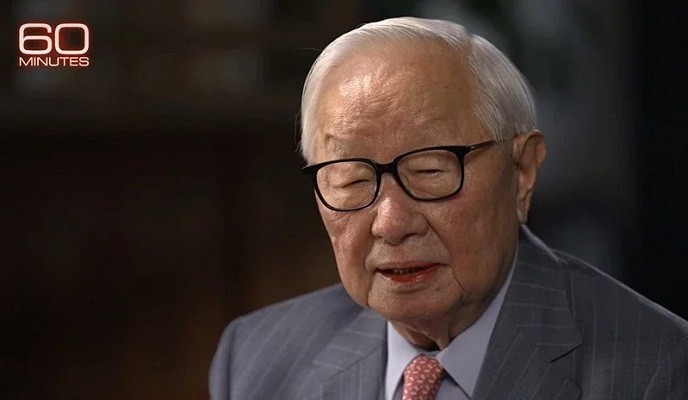Ever since Mao Tse Tung won China's civil war in 1949 and the losing anti-communist side fled to a small, nearby island, Beijing has insisted that that island, Taiwan, is an integral part of the mainland. The U.S. has walked a tightrope, respecting that "One China" policy, but maintaining a special relationship with Taiwan, today a progressive, thriving democracy.
In September, President Biden vowed on this broadcast that the U.S. will protect Taiwan. This past week, the Taiwanese government said China aims to normalize its military pressure on the island, that escalated after House Speaker Nancy Pelosi visited in August with its largest military drill ever.
In a display of frightening military might, China subjected Taiwan to three days of continuous sorties, with over 100 warplanes, a barrage of ballistic missiles and warships that encircled the island. Delivering a loud and clear message: that China could choke Taiwan any time it wanted to.
Lesley Stahl: You think they're going to invade?
Lee Hsi-min: This is not a matter of if they will invade, it's a matter of when they will invade.
Admiral Lee Hsi-min, who used to head Taiwan's armed forces, has been ringing alarm bells for years because as China's military has been growing, Taiwan's is shrinking. The number of soldiers in uniform has been cut in half over the years, the length of mandatory service has been reduced to just four months, and Admiral Lee complains that the government has been buying the wrong weapons for years: tanks and jets from the United States instead of smaller portable missiles.
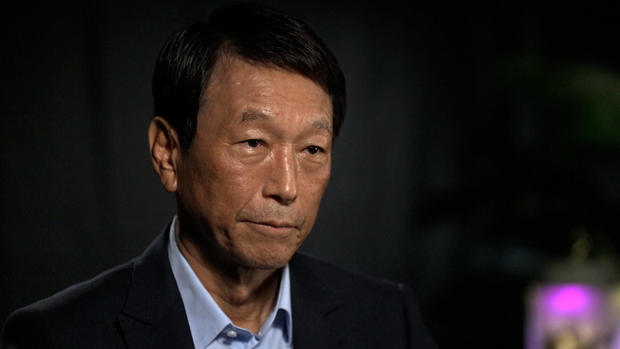 Admiral Lee Hsi-min
Admiral Lee Hsi-min
Lesley Stahl: What I gather you think the military needs are these stingers and javelins and drones, exactly what they need in Ukraine.
Lee Hsi-min: Yeah. It's the truth.
Lesley Stahl: And you're not getting them now because --they're giving them to Ukraine?
Lee Hsi-min: No. We already ordered it. In my view, not enough. But however, we began to order them. But we have not yet received any. Because other countries also have kind of similar requirements. We are not on the top list. But we need now. We need now.
Lesley Stahl: Did the Taiwanese military waste all those years buying those big weapons?
Lee Hsi-min: I believe so, you know, but we don't have time to waste anymore.
Taiwan doesn't get U.S. military aid, it buys the weapons. But the manufacturers can't keep up with the demand. The Taiwanese have already purchased about $14 billion worth of weapons that they have yet to receive. We were surprised that few here seem to share the admiral's sense of urgency.
Here in Taiwan, you'd never know that the dragon to the north recently sent warships to surround the island. People told us over and over, "no big deal" China's been doing versions of that for 70 years. While much of the world thought an invasion was imminent, polls showed that a majority of Taiwanese think that's unlikely any time soon, if ever.
And that's reflected in what we saw in the capital, Taipei, where life goes on uninterrupted. Morning traffic flows normally. Shoppers do what they always do, during the day and at night.
We saw old people painting outdoors; and teenagers practicing hip-hop routines – despite the threat from the north.
Wang Ting-yu: This kind of threat is our daily life.
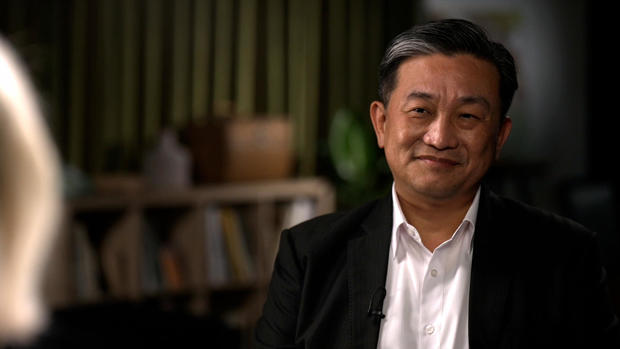 Wang Ting-yu
Wang Ting-yu
Wang Ting-yu, a parliamentarian from southern Taiwan, says a kind of war has already started.
Wang Ting-yu: China, they try to annex Taiwan for past 50 years. They try all different kind of way. Maybe I can give you very concrete figures: there are 20 million cyberattacks, per day.
Lesley Stahl: Per day?
Wang Ting-yu: Yes, every day.
Wang, who sits on Parliament's Foreign Affairs and National Defense Committee, took us to a high-security lab where engineers track those attacks.
Engineer: This is Taiwan here.
Lesley Stahl: Ah, okay.
Engineer: A small island. But we are proud of it.
A map shows the attacks from China in real time as they hit Taiwan.
Lesley Stahl: It's so close to China.
Engineer: Yeah. Unfortunately.
Lesley Stahl: So is China hoping to defeat Taiwan without firing a single shot?
Wang Ting-yu: They dream like that.
Lesley Stahl: "They dream."
Wang Ting-yu: They desperately dream like that.
He says on top of cyber warfare, they're trying to sabotage Taiwan's thriving economy and intimidate politically-powerful groups, like the farmers and fishermen in Wang's home district of Tainan who've been hit especially hard with a series of export bans.
Lesley Stahl: When Speaker Pelosi was here, China, we're told, banned 1,000 products. Taiwanese products. A lot from your region down here.
Wang Ting-yu: It do hurt, do damage to some individual businesses.
Like the fish industry.
Lesley Stahl: Is there any grouper here?
90% of grouper exports went to China last year.
But suddenly in June, Beijing banned Taiwan's grouper, devastating the fishermen. Boxes and boxes of fish piled up. China also went after pineapples, crushing farmers like this young couple.
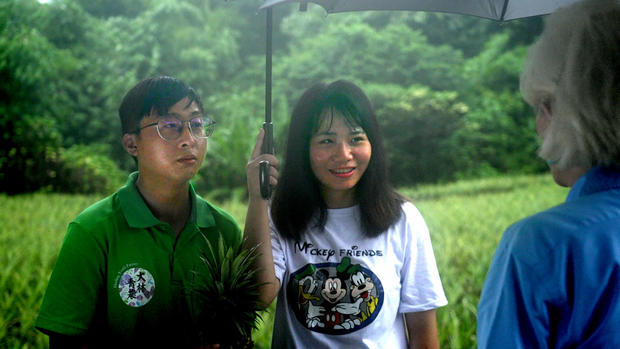
A farming couple in Taiwan
Man Farmer: (translation) It devastated us. Our pineapples got stuck in Taiwan and we lost $60,000 U.S. dollars.
Lesley Stahl: And I understand the ban was sudden, like that. No warning.
Woman Farmer: No warning.
The government fought back with a "Freedom Pineapple" campaign to entice everyone to buy and eat a lot of pineapples.
Lesley Stahl: Oh my gosh, it's so sweet.
Wang Ting-yu: Our housewives, they have a voice, "Let's eat pineapple on our dining tables."
Lesley Stahl: Everybody's eating pineapple.
Wang Ting-yu: Military, they have lunch, they have dinner - provide pineapples.
We found a fairly prosperous country, a leading exporter of bicycles and other sports gear. This tiny island is a tech giant -- in agriculture innovation and, above all, in semiconductors. Taiwan is practically the world's only source of the thinnest microchips, manufactured almost exclusively by one company: TSMC.
China relies on these as does the rest of the world for things like iPhones, advanced computers, and car components. 91-year-old Morris Chang, TSMC's founder, explains why a lot of people here think the chips protect them from Xi Jinping's attacking.
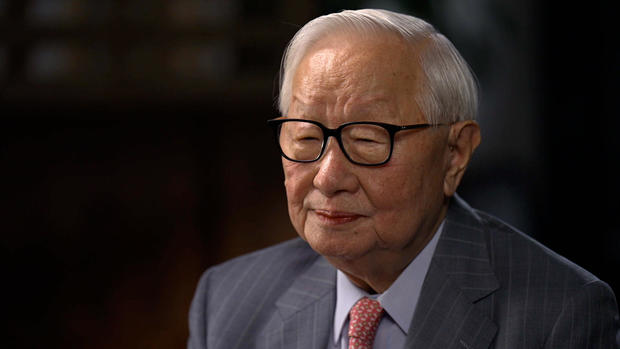
Morris Chang
Lesley Stahl: I've heard this expression, Silicon Shield or Chip Shield, talking about your company.
Morris Chang: Well, it means that perhaps because our company provides a lot of chips to the world maybe somebody will refrain from attacking it. If that person's priority is for economic well-being I think they will refrain from attacking.
Lesley Stahl: What if the priority is to come here and nationalize your company within, you know, One China?
Morris Chang: If there's a war, I mean, it would be destroyed. Everything will be destroyed.
Wang Ting-yu: China says -- some of the Chinese Communists say: Let's invade Taiwan and occupy TSMC, make it become party-owned company. Then we will be a superpower! United States and Japan and Europe - we don't supply them chips, they will follow Chinese orders! But that's naïve.
Lesley Stahl: Why is that naïve?
Wang Ting-yu: Not only chip company, even a sausage company - you need a recipe! You need human capital! You need to know how to manufacture, manufacturing that kind of product.
Lesley Stahl: If there is reunification, what would happen to you?
Wang Ting-yu: Die.
Lesley Stahl: Die?
Wang Ting-yu: Yeah. If they annex Taiwan, people like me, a lot, will be perished.
Beijing has sanctioned Wang Ting-yu personally for being outspokenly pro-Taiwan's independence. He passionately defends the country's progressive democracy. We saw campaign billboards everywhere, validating the island's commitment to clean elections and freedom of speech. Beijing has promised that if there were re-unification, Taiwan could maintain many of its freedoms.
And yet, in 2019, China broke a similar promise to Hong Kong. Protests led to beatings, arrests, and stripping of democratic rights. It hit home in Taiwan and led to President Tsai Ing-wen, leader of the aggressively anti-reunification party, winning re-election in a landslide.
President Tsai Ing-wen in 2019: We are firmly resolved to defend our freedom, democracy and way of life.
Given what happened in Hong Kong and the recent military escalation, we were curious why the people are so stoic.
Asked if they're in denial, or apathetic, a Taiwanese writer said it's kind of like global warming: "you know it's there's and it's going to get worse… but mostly people go about their lives. What can one individual really do?"
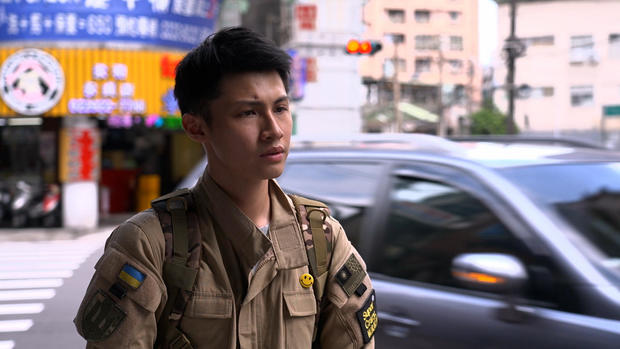 Jack Yao
Jack Yao
But then the taiwanese watched the Ukrainians stand up to the Russians. It so inspired Jack Yao, a young Taipei coffee vendor, that he went there to help the fight.
Lesley Stahl: Did you go because you're Taiwanese?
Jack Yao: Yeah. Because -
Lesley Stahl: What's the connection?
Jack Yao: Just, like, in the Ukraine situation and our situation - it's very alike. They also have big neighbors. And they was the communists. And we have to face the China communists. And then they want to attack us. They always want to attack us.
Lesley Stahl: Was it in your mind that if you go to fight for Ukraine, other people will come here and fight for Taiwan–
Jack Yao: Yes!! Yeah.
What the Ukrainians have done is raising a question here in Taiwan: if that small democracy can stand up to its menacing neighbor – why can't we? You see civil defense classes sprouting up - like one on how to identify Chinese fake news during an attack…
And a night class in the park on how to operate two-way radios in morse code in case the internet is knocked out.
Enoch Wu: We want our students to be able to apply a tourniquet within 30 seconds.
Enoch Wu, a former special forces soldier, is running training workshops in how to treat bullet and shrapnel wounds and conduct search and rescue.
And Admiral Lee wants to take it a step further, calling on the government to arm Taiwan's citizens and create a volunteer force like Ukraine's.
Lee Hsi-min: If Ukraine can do that, why not Taiwan? You know, I'm trying to convince more people that it's important because this is a symbol of the deterrence. Determination!
Lesley Stahl: So you're proposing what, I guess I would call, the Ukraine model.
Lee Hsi-min: Similar. Ukraine people really inspire our people. But do our people change fast enough? I don't think so.
Lesley Stahl: Do you think that Taiwanese have that same kind of determination?
Wang Ting-yu: I strongly believe this. Because we cherish how we live. We love peace, we don't like war, but we won't cede our democracy, our life for peace. That's surrender.
Lesley Stahl: Is there a chance you'll surrender?
Wang Ting-yu: No, not a chance. Never.
Produced by Shachar Bar-On and Jacqueline Williams. Associate producer, Jinsol Jung. Broadcast associate, Wren Woodson. Edited by Peter M. Berman.





